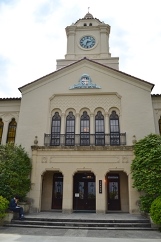2016
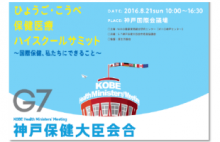
High School students explore Global Health “What can we do for Global Health?” Hyogo-Kobe GLOBAL HEALTH High School Summit
The Summit is one of the pre-events for the Kobe G7 Health Ministers’ Meeting, to be held in Kobe from September 11-12, and will feature high school students in Hyogo Prefecture, and as future leaders, will discuss how they and the entire community can contribute to global health.
For over six months, the Summit Organizing Committee Members comprised of 18 students from 6 Hyogo high schools have taken all of the responsibility for organizing the Summit, managing its implementation, and drafting a Declaration. They have been actively discussing, and make presentations on 21 August, on four themes; “AMR (antimicrobial resistance)”, “Communicable Diseases”, “Self-medication”, “Maternal and Child Health”, “Ageing”, and “Health promotion through food education”. At the Summit, participants will adopt the Hyogo-Kobe GLOBAL HEALTH High School Summit Declaration after a day-long program of research presentations, a panel discussion and viewing 50 poster presentations. The declaration will be handed to WHO Director General Dr Margaret Chan at the WHO Research Dissemination Forum on universal health coverage, innovation and ageing populations on 10 September 2016 in Kobe.
Ms Emiri Morita of Kobe University Secondary School mentions “We are committed to do our best to make the best school summit.”
Hyogo-Kobe GLOBAL HEALTH High School Summit
Time: 21 August, 2016 10:00-16:30(opens 09:30)
Venue: Kobe International Conference Center 3F
International Conference Room
(〒650-0046 MInatojimanaka 6-9-1 Chuoku Kobe TEL 078-302-5200)
Number of Participants: 300(High School Students and their parents only)
Language: English Japanese simultaneous interpretation available
Organized by: WHO Kobe Centre and G7 Kobe Health Ministers' Meeting Promotion Council
Supported by: Ministry of Health, Labour and Welfare
The Summit Organizing Committee:
Hyogo High School, Hidaka High School, Tatsuno Kita High School,
Fukiai High School, Kobe University Secondary School,
Mukogawa Women’s University Junior and Senior High School
(Communication and Admiration Team (8 students),
Declaration Drafting Team (5 students),
Poster Session Management Team (5 students))
Programme
10:00-10:30 Opening
Alex Ross, Director, WHO Kobe Centre
Toshizo ido, Governor, Hyogo Prefecture
Kizo Hisamoto, Mayor, Kobe City
Yasuhisa Shiozaki, Minister of Health, Labour and Welfare
10:30-11:40 Session 1: High School Presentations
Mukogawa Women’s University Junior and Senior High School,
Fukiai High School, Hyogo High School,
11:40-13:30 Poster Sessions & Lunch
13:30-14:30 Session 2: High School Presentations
Kobe University Secondary School, Hidaka High School,
Tatsuno Kita High School
14:30‐16:00 Session 3: Panel Discussion (international panellists) “What can we do for Global Health”
Participants: High School students, international panellists and domestic experts
Moderators: Prof. Noriko Katada (University of Hyogo), Prof. Shinjiro Nozaki (WHO Kobe Centre)
16:00‐16:30 Declaration Adoption
16:30 Closing

WKC Forum report "Global Health Issues: Improving health and health security for the world From Ise Shima Summit to the G7 Health Ministers’ Meeting in Kobe"
The WHO Kobe Centre, along with Kwansei Gakuin University (KGU) and the G7 Kobe Health Ministers’ Meeting Promotion Council organized an open public Forum “Global Health Issues: Improving health and health security for the world” on 8 June 2016 at KGU.
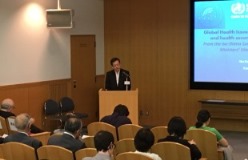
The objective of this public forum was to raise awareness of global health, including Japan’s leadership role, issues that will be considered at the G7 Health Ministers' Meeting (100 days from now), to give university students in the Kansai region an opportunity to learn and to think about global health, the work and role of the WHO Kobe Centre, and possible careers in international health. About 100 people attended the Forum.
Dr Mitsuaki Yamamoto, Chief Medical Officer of Hyogo Prefecture mentioned in the opening that, based on the G7 Ise Shima Vision for Global Health, the G7 Kobe Health Ministers’ Meeting in Kobe in September 2016 is expected to further discuss global health priority issues that students and citizens should closely follow.
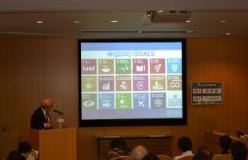
He emphasized the importance of health system strengthening to achieve universal health coverage (UHC), emphasizing equity (“leaving no one behind”). In particular, Mr Ross introduced the new WHO Comprehensive Health Emergency Programme which reinforces WHO’s actions to support countries implement the International Health Regulations, the Sendai Framework for Disaster Risk Reduction, and to coordinate with all stakeholders. The Government of Japan was congratulated for its $50 million contribution to WHO’s programme. Mr Ross stressed the need for countries to ensure basic functioning health systems to prevent and detect new outbreaks, and that the information and biotechnology revolutions offer many new opportunities.
Mr Ross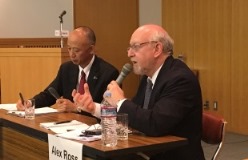 discussed the WHO Kobe Centre’s research priorities focusing on UHC, Innovation, and Ageing and how the Centre’s work is contributing to the planning for a rapidly ageing world, to achieve UHC, and to translate lessons and innovations from and to Japan. Japanese and international academias are important partners of WKC.
discussed the WHO Kobe Centre’s research priorities focusing on UHC, Innovation, and Ageing and how the Centre’s work is contributing to the planning for a rapidly ageing world, to achieve UHC, and to translate lessons and innovations from and to Japan. Japanese and international academias are important partners of WKC.
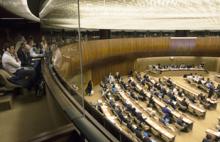
G7 Ise-Shima Summit announces major global health agenda; World Health Assembly endorses WHO programme for health emergencies and strategy for ageing and health
May 27 -- The G7 Ise-Shima Leaders’ Declaration released today establishes an ambitious action agenda for global health to tackle the most pressing challenges facing countries and communities. It calls for actions to support countries plan and respond to health emergencies; to achieve universal health coverage (UHC), including for healthy and active ageing and a new global UHC2030 coordination platform; and for reducing antimicrobial resistance.
The G7 Health Ministers meeting in Kobe on 11-12 September 2016 will further discuss these new global health issues and required actions.
WHO Member States at the World Health Assembly in Geneva have also endorsed a significant reform to establish a new WHO Health Emergencies Programme that increases WHO’s operational capabilities for outbreaks and humanitarian emergencies.
WHO Member States, including Australia, Germany, Japan and Sweden, stepped forward with financial support for the new Programme. The Government of Japan committed $US 50 million to support WHO’s emergencies work.
“I particularly welcome the contribution of $50 million from the Government of Japan, a sign of confidence in our new Health Emergencies Programme from a long-standing supporter of WHO's work in emergencies,” Dr Margaret Chan, WHO Director General, said.
“We strongly expect WHO to play a leading role in responding to health emergencies, in its capacity as the sole technical agency in the field of global health,” said Ms Fusae Ota, Parliamentary Vice Minister of Health, Labour and Welfare of Japan.
WHO Member States have also approved a new WHO Global strategy and action plan on ageing and health, 2016-2020. The aim of the strategy is for every country to commit to action on healthy ageing. Actions include alignment of health systems to the needs of older populations and development of age-friendly environments. The strategy envisages the development of sustainable and equitable UHC, systems of long-term care, and improved measurement, monitoring and research. It emphasizes equity and human rights, including the important role of involving older adults in all decisions that concern them.
The WHO Kobe Centre supports these activities through research on UHC, innovation and ageing, and works closely with many parts of WHO worldwide.
Links
- G7 Ise-Shima Leaders’ Declaration
- WHO - About WHO
Renewed partnerships build momentum for WHO’s new Health Emergencies Programme - WHO - Media centre
World Health Assembly agrees resolutions on women, children and adolescents, and healthy ageing - WHO - Ageing and life-course
The Global strategy and action plan on ageing and health
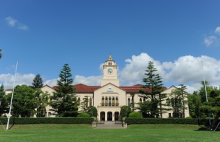
WKC Forum "Global Health Issues: Improving health and health security for the world From Ise Shima Summit to the G7 Health Ministers Meeting in Kobe"
The WHO Kobe Centre, along with Kwansei Gakuin University (KGU) and the G7 Kobe Health Ministers’ Promotion Committee, is organizing an open public Forum “Global Health Issues: Improving health and health security for the world” on 8 June 2016 at KGU.
Better health is central to human happiness, well-being, and to human and health security. This is a central theme of the G7 Meeting in Ise Shima later this month on 26-27 May 2016 and the G7 Health Ministers' Meeting on 11-12 September 2016 in Kobe City. G7 member countries will discuss major issues and opportunities to advance global health, increase protection of people’s health in a globalized world, and demonstrate strong leadership for collaborative efforts among nations, international organizations, NGOs, industry and others.
Recent communicable disease outbreaks of Ebola in West Africa, Zika in the Americas and beyond, MERS-CoV, influenza, dengue, malaria, as well as earthquakes such as in Kumamoto, Ecuador, and Nepal, cyclones, floods, tsunamis and other natural disasters -- all remind us of the immediate and increasing risks and the need to collectively act. The International Health Regulations (IHR) and the Sendai Framework for Disaster Risk Reduction 2015–2030 are key international instruments to supports countries’ actions in these areas.
Improving health and disaster risk reduction requires that countries and communities build, reinforce and transform their health systems to achieve universal health coverage (UHC). This is needed to ensure everyone, everywhere, can access quality health services without being forced into poverty, and that populations are protected (health security). Outbreaks such as Ebola and other health emergencies showed that countries without functioning health systems and basic public health infrastructure in place cannot withstand sudden shocks or health crisis, nor can they improve health of their people.
The objective of this public forum (WKC Forum) is to raise awareness of global health, including issues that will be considered at the G7 Health Ministers' Meeting, to give university students in the Kansai region an opportunity to learn and to think about global health, the work and role of the WHO Kobe Centre, and possible careers in international health.
Global Health Issues: Improving health and health security for the world From Ise Shima Summit to the G7 Health Ministers Meeting in Kobe
Venue:Kwansei Gakuin University Library Hall
(〒662-8501 Uegahara 1-1-155 Nishinomiya TEL 0798-54-6442)
Number of Participants:150(RSVP・Free of charge)
Language:English–Japanese simultaneous interpretation available
Programme:
15:10-15:20 Opening
Jun Kukita, Visiting Professor (Top Global University Project), Kwansei Gakuin University
15:10-15:20 Remark
Mitsuaki Yamamoto, Chief Medical Officer, Hyogo Prefecture
15:20-15:50 Lecture
Global Health Issues: Improving health and health security for the world
- From the Ise Shima Summit to the G7 Health Ministers’ Meeting in Kobe
Alex Ross, Director, WHO Kobe Centre
15:50-16:05 Dialogue between Alex Ross & Professor Kukita on international careers “How to be a global citizen”
16:05‐16:30 Open Discussion (Q&A)
16:40 Closing
Register now!
General admission FREE - RSVP required, register online @ https://goo.gl/F2LgtP (Japanese) by June 6.

Urban health: major opportunities for improving global health outcomes, despite persistent health inequities
New data on the health of city-dwellers in almost 100 countries show that as the world’s urban population continues to grow, health inequities - especially between the richest and poorest urban populations - are a persistent challenge, according to a report by the World Health Organization (WHO) and the United Nations Human Settlements Programme (UN-Habitat).
For example, only half of households in urban areas of 91 countries with comparable data have access to piped water, with the richest 20% of households being 2.7 times more likely to have access to piped water than the poorest 20%. In Africa, this ratio is closer to 17 times.
About 3.7 billion people live in cities today. A further 1 billion people will be added by 2030, with 90% of the growth being in low- and middle-income countries. This intensifies the need to realize the Sustainable Development Goal (SDG) target of ensuring universal health coverage (UHC): that all people obtain the health services they need without suffering financial hardship when paying for them, by 2030.
Health inequalities undermine progress
The report finds that in 79 low- and middle-income countries, children in the poorest one fifth of urban households are twice as likely on average to die before their fifth birthday compared with children in the richest fifth. In nearly 9 of 10 countries for which comparable data was available, the urban poor did not achieve the Millennium Development Goal target for reducing under-five mortality.
The report emphasizes the urgency of addressing health disparities and their determinants in cities as countries strive to achieve the SDGs and identifies innovative ways to achieve UHC that are emerging in such diverse cities as Guangzhou and Lagos, Lima and San Francisco, among many others.
“There is an urgent need to identify and reduce health inequities, particularly for the most vulnerable populations, such as the nearly 1 billion people living in urban slums or informal settlements today,” said Dr Marie-Paule Kieny, WHO Assistant-Director General for Health Systems and Innovation. “This report gives countries and cities practical tools to reduce health inequities and achieve the SDGs.”
While a number of urban areas have improved health coverage, the report finds that coverage for the poor still lags behind. Currently, at least 400 million women, men and children around the world are excluded from what is a basic human right: access to affordable health care. They have little or no access or to health services, and health insurance that is inadequate or non-existent. The report includes a new Urban UHC Dashboard-- an analysis of nine indicators for 94 countries-- which shows that vast inequalities in health service coverage persist, despite urban areas reporting higher coverage of services than their respective national average levels.
Planning cities for people and health
Increasing urbanization poses a unique set of health challenges, including the double burden of non-communicable and infectious diseases, air pollution, access to water and sanitation, and the need to improve nutrition, increase physical activity, and build resilience to health emergencies. Meeting those challenges will require countries and cities to take bold steps towards UHC.
The ways that cities are planned, today and for the future, can profoundly affect the ability of their residents to live long, healthy and productive lives. The report presents solutions for ensuring accessibility to water and sanitation, reducing urban sprawl while developing new transport options, increasing road safety, making cities age-friendly and accessible for persons with disabilities, managing urban health emergencies and increasing resiliency, while also improving healthier homes, particularly for those living in urban slums.
The report further presents a comprehensive set of interventions that can reduce the urban burden of non-communicable diseases. These include smoke-free city ordinances and enforcement; altering the built environment and promoting alternative transport options to foster greater physical activity and reduce air pollution; new approaches to urban food environment to reduce malnutrition and obesity; affordable and healthy housing conditions, and safety-related efforts.
Together, these have tremendous impact on reducing diarrheal diseases, indoor and ambient air pollution, non-communicable diseases, and other diseases saving millions of lives and increasing quality of life. A variety of examples from New York City and China to Mexico City, Barcelona, and South Africa illustrate these impacts, particularly using multiple interventions.
“In cities, progress in health depends not only on the strength of health systems, but also on shaping urban environments. Capitalizing on such interdependent factors leads to efficiency, synergies and co-benefits, and is essential to attaining the SDGs,” said Alex Ross, Director of the WHO Centre for Health Development in Kobe, Japan, which led and wrote the report.
“A healthy population is essential for creating economically competitive and inclusive cities,” said Joan Clos, Executive Director of the United Nations Human Settlements Programme (UN-Habitat). “This new report documents opportunities for joint action to implement the SDGs, and is an important contribution to the Third United Nations Conference on Housing and Sustainable Urban Development to take place in Quito in October 2016 and to the realisation of the New Urban Agenda.”
Downloads
Report by Sections
- Section 1 - A vision for Healthier Cities
- Section 2 - Plan Cities for People
- Section 3: A Renewed Focus on Urban Governance & Annexes
- References
Executive Summary

WKC Forum report "Fight against Communicable Diseases - Thinking about Global Health Governance @ Kobe & Hyogo"
The WHO Kobe Centre, along with the G7 Kobe Health Ministers' Meeting Promotion Committee and the Ministry of Health, Labour and Welfare, Japan held an open, public Forum “Fight against Communicable Diseases -Thinking about Global Health Governance @ Kobe & Hyogo,” on 24 February 2016, from 18:00 to 19:30 at the Kobe International Conference Center.
This autumn, on 11 and 12 September 2016, the G7 Health Ministers' Meeting will be held in Kobe City, where the G7 countries (Canada, France, Germany, Italy, Japan, United Kingdom and USA) will discuss urgent global health issues, including how national and local health policies and systems can prevent and control communicable diseases and be better prepared for natural disasters and health risks – referred to as “Global Health Governance” and Global Health Risk Management.
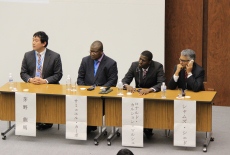 About 250 people attended the Forum with participants from the Kobe City Diet, Kobe City, Hyogo Prefectural and other municipal governments, health professional and associations, students, and the public at large. Four speakers from the WHO and from Sierra Leone made presentations (slides attached).
About 250 people attended the Forum with participants from the Kobe City Diet, Kobe City, Hyogo Prefectural and other municipal governments, health professional and associations, students, and the public at large. Four speakers from the WHO and from Sierra Leone made presentations (slides attached).
Mr Mitsuaki Yamamoto, Chief Medical Officer, Hyogo Prefecture, welcomed the audience and, on behalf of hosting place for the G7 Health Ministers meeting in 2016, thanked the WHO Kobe Centre for organizing the Forum and the speakers for their participation. He noted the timeliness of the Forum as it is 200 days before the G7 Health Ministers meeting and the relevance of global health and human security to Hyogo Prefecture and Kobe City.
Mr Alex Ross, Director of the WHO Kobe Centre, welcomed the audience, and thanked the G7 Health Ministers Promotion Committee, Hyogo Prefecture, Kobe City, the Japanese Ministry of Health, Labour and Welfare, and the speakers. He remarked how many outbreaks and disasters -- from the recent Zika virus, Ebola, spread of dengue, earthquakes in Nepal and Taiwan, typhoons in Fiji – require collective action to build resilient health systems, preparedness, and support resilient societies and people. He further applauded Prime Minister Abe and the Government of Japan for its leadership on global health security, an issue that will be discussed at the G7 Summit in Ise-shima and at the G7 Health Ministers meeting in Kobe.
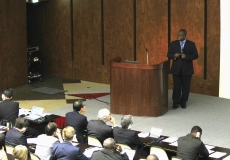
Dr Samuel Kargbo, Director of Ministry of Health from Sierra Leone, one of the Ebola affected countries, spoke about “Experiences and lessons learnt on the fight against Ebola, How to increase effectiveness of disaster risk management”. Dr Kargbo talked how the initial response to the Ebola was difficult, with lack of scientific knowledge, weak community engagement and awareness (including for safe burial procedures), inadequate surveillance, and inadequate Infection Prevention and Control (IPC). Analysing and learning from various issues people faced at the height of the outbreak, a new incident management system is now established and applied to every district. He mentioned some key recommendations for all countries: focus on community health systems; set up comprehensive quality assurance and infection prevention and control systems, have uninterrupted supplies of needed commodities, and strengthen the surveillance and laboratory system. Smooth communications and response among community, district, and national level could be realized.
Dr Ronald Carshon-Marsh, the Medical Superintendent of Kono District in Sierra Leone (one the hardest hit areas from Ebola) talked about how they fought against the outbreak, without enough knowledge and experiences, protective equipment or standardized training. Dr Carshon-Marsh discussed how he also had to face the death of his colleagues. The community lacked confidence in the health workers; revolting against them and attacked hospitals—with doctors leaving. The suspected cases needed to be transported from one place to another and as a result, spread the disease further through direct contact with contaminated body fluids. WHO, US Centers for Disease Control and Prevention (CDC), and the International Rescue Committee (IRC) and other organizations were fully supportive. They assisted the local health authorities to develop a concerted and coordinated plan and response, including the key action to engage community chiefs/traditional leaders. Global and local actions helped to end the outbreak.
Dr Shamsuzzoha Babar Syed, Coordinator, Quality and UHC, Service Delivery and Security Department, WHO Geneva, talked about WHO’s efforts to support the Ebola affected countries. He noted the important lessons obtained from the realities at the front line in these countries. These lessons are helping to inform how WHO, international organizations, countries, and partners can further refine global health governance for health emergencies. Inspired by and working with frontline workers like Dr Kargbo and Dr Carshon-Marsh worked tirelessly in their country at the height of the response, WHO has been helping countries in early recovery efforts that would lead to sustainable, functional and resilient health systems. The road to early recovery starts with re-establishing strong health systems and key actions needed are: to safely reactivate essential health services; rebuild community trust and engagement, ensure safety of health workers and patients and the delivery of quality health services. He noted that global health security cannot happen without local health security and emphasized quality UHC with disaster preparedness, response and recovery embedded in health system strengthening and development.
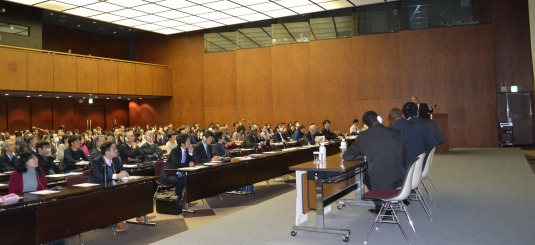
Programme & Speakers (Japanese)
Presentations
Toward More Age-friendly Cities: The example of Bilbao (Spain)
The WHO Kobe Centre, in partnership with the WHO Department of Ageing and Life Course, has released a new framework and guide for indicators for cities to assess age-friendliness: “Measuring the age-friendliness of cities: A guide to using core indicators” in English, Chinese, French and Spanish. The new WHO Guide is an important tool that aims to promote the practice of measurement and indicator assessments, globally.
There are a total of 16 indicators that are designed to assess the physical and social environment, such as access to transportation and social participation, as well as quality of life and equity. These indicators were developed based on international expert consultations, surveys of local government and community representatives and a pilot study with 15 communities from 12 countries.
One of the pilot sites, Bilbao city in the northern part of Spain, identified access to public transportation as one of their priorities. Taking into account the indicator assessment results they produced in the pilot study, the city announced that it aims to improve the proportion of households within walking distance (500 meters) from at least two public transportation networks from the current 84% to 100% (see Figure 1).
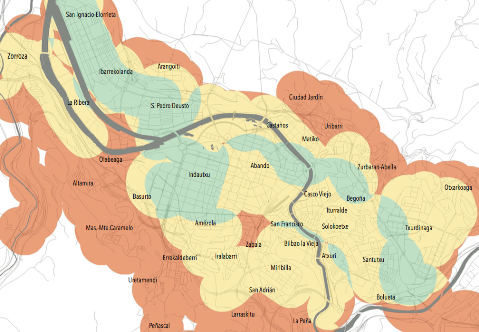
Note: Green areas are within walking distance (500 meters) of all 3 major public transit networks: urban bus and tram stops, subway stations and bicycle lanes. Yellow areas are within walking distance of 2 of the 3 transit networks. Orange areas are within walking distance of 1 of the 3 transit networks.
Results and Implications
The 15 pilot sites across 12 countries were each able to calculate several if not most of the indicators, although data availability and data collection methods varied. The ability to appropriately adapt the assessment method to the local context was found to be very important, and this required flexibility and innovation.
The pilot sites recognized the importance of assessing equity, that is the extent to which the features of an Age-friendly environment are fairly distributed throughout the area and population, but in practice, they found it very difficult to measure.
Furthermore, the study showed that the quality and practical value of the assessment is enhanced by engaging local residents including older people in the process to validate the data and also to link the assessment results to specific actions that can be taken.
Conclusion
Given the global demographic trends of urbanization and population ageing, it will become increasingly important to enhance the age-friendliness of cities. In order to do so, and to support planners and decision-makers, it is necessary to build the evidence base on the needs, effectiveness, efficiency and equity of such initiatives using clearly defined indicators. The new framework and indicator guide published by the WHO is a tool that aims to promote the practice of indicator assessments, globally, and the pilot site results suggest that it has utility across diverse contexts.
Related Links
- World report on ageing and health. Geneva: World Health Organization; 2015
- Global age-friendly cities: a guide. Geneva: World Health Organization; 2007
References
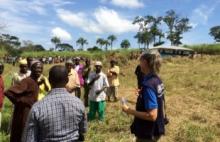
WKC Forum "Fight against Communicable Diseases - Thinking about Global Health Governance @ Kobe & Hyogo -"
The WHO Kobe Centre, along with the G7 Kobe Health Ministers' Meeting Promotion Committee and the Ministry of Health, Labour and Welfare, is organizing an important open, public Forum “Fight against Communicable Diseases -Think about Global Health Governance @ Kobe & Hyogo,” on 24 February 2016, from 18:00 to 19:30 at the Kobe International Conference Center.
This autumn, on 11 and 12 September 2016, the G7 Health Ministers' Meeting will be held in Kobe City, where the G7 countries (Japan, USA, United Kingdom, France, Germany, Italy, and Canada) will discuss urgent global health issues, including how national and local health policies and systems can control communicable diseases and better prepare for natural disasters and health risks – referred to as “Global Health Governance” and Global Health Risk Management.
The world has learned a great deal from the Ebola – the largest and longest disease outbreak in history. Lessons from the Ebola outbreak are shaping a more strategic approach going forward – which is expected to be discussed at the G7 meetings this year. Thanks to great and continuous efforts by international society and WHO, the Ebola outbreak is now approaching to an end. One of the lessons the world learnt is that countries without strong health systems and basic public health infrastructures in place cannot withstand sudden shocks or health crisis. For example, the MERS-COV, influenza, dengue, and now Zika virus outbreaks all remind us of the immediate need to act.
In this Forum, experts from one Ebola affected country, Sierra Leone, and from WHO, will share their experiences and lessons followed by a Q&A session that will be open to all participants. We encourage the public to attend this Forum.
Commemorating 200 days before G7 Kobe Health Ministers Meeting
Fight against Communicable Diseases -Thinking about Global Health Governance @ Kobe & Hyogo-
Time: 24 February, 2016 18:00-19:30(opens 17:30)
Venue: Kobe International Conference Center 3F International Conference Room(〒650-0046 MInatojimanaka 6-9-1 Chuoku Kobe TEL 078-302-5200)
Number of Participants: 200(RSVP・Free of charge)
Language: English–Japanese simul interpretation available
Organized by: WHO Kobe Centre and G7 Kobe Health Ministers' Meeting Promotion Committee
Supported by: Ministry of Health, Labour and Welfare
Programme
18:00-18:15 Opening Miatsuaki Yamamoto, Chief Medical Officer, Hyogo Prefecture/Alex Ross, Director, WHO Kobe Centre
18:15-18:30 "Summary: Global Health Governance–Lessons learnt from MERS, new pandemic influenza, and Ebola"
Ryoma Kayano, Technical Officer, MD (Health Risk Management), WHO Kobe Centre
18:30-18:45 “Fighting against Ebola” -Representative from Ministry of Health/Sierra Leone
18:45-19:00 “Fighting against Ebola” -Health Worker from Sierra Leone
19:00-19:15 "WHO’s response to Ebloa” -Dr Shamsuzzoha Babar Syed, MD, Coordinator, Service Delivery and Security, WHO Headquarter
19:15-19:30 Open Discussion (Q&A)
19:30 Closing
RSVP:Please send your name, organization, title and contact details by email, fax or post by 22 Februrary.
WHO Kobe Centre WKC Forum
1-5-1 Wakinohama-Kaigandori Chuo-ku, Kobe 651-0073 Japan
Telephone: (+81) 78-230-3100
Fax: (+81) 78-230-3178
E-mail: wkc@who.int
For more details:Invitation and RSVP/Flyer (Japanese)
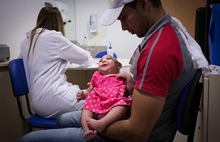
WHO announces a Public Health Emergency of International Concern
1 February 2016 — WHO announced today that the recent cluster of neurological disorders and neonatal malformations reported in the Americas region constitutes a Public Health Emergency of International Concern. This comes after the International Health Regulation Emergency Committee agreed that a causal link between this cluster and Zika virus disease is strongly suspected. It constitutes an “extraordinary event” and a public health threat to other parts of the world.
- WHO Director-General summarizes the outcome of the Emergency Committee regarding clusters of microcephaly and Guillain-Barré syndrome
- WHO statement on the first meeting of the International Health Regulations (2005) (IHR 2005) Emergency Committee on Zika virus and observed increase in neurological disorders and neonatal malformations
2015

Report of the Second WHO Global Forum on Innovation for Ageing Populations, 7-9 October 2015, Kobe, Japan
The report of the Second WHO Global Forum on Innovation for Ageing Populations is now available. The World Health Organization Centre for Health Development (WHO Kobe Centre, WKC) convened the Forum to build upon the platform WKC created in 2013 to share information, debate and drive new thinking about the current and emerging health and social challenges surrounding ageing populations and innovations. The Forum, with its theme “IMAGINE TOMORROW,” explored ideas for transforming communities, systems, and technologies for ageing populations worldwide – developments that are timely and key to attaining universal health coverage (UHC) and the new Sustainable Development Goals.
Background
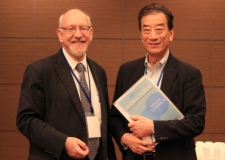 Two years after convening the first one, the World Health Organization (WHO) held its second WHO Global Forum on Innovation for Ageing Populations on 7-9 October 2015 that successfully gathered 212 participants from 24 countries in Kobe, Japan, in exploring visions of transformation in communities, systems, and technologies for ageing populations worldwide. Organized by the WHO Centre for Health Development, also known as the WHO Kobe Centre, the 3-day forum brought together diverse stakeholders - policy-makers and government representatives, members of the academia and the research community, funders, public health professionals, innovators from civil society and the private sector and older people’s voices - to highlight and accelerate social as well as technological innovations for older adults globally.
Two years after convening the first one, the World Health Organization (WHO) held its second WHO Global Forum on Innovation for Ageing Populations on 7-9 October 2015 that successfully gathered 212 participants from 24 countries in Kobe, Japan, in exploring visions of transformation in communities, systems, and technologies for ageing populations worldwide. Organized by the WHO Centre for Health Development, also known as the WHO Kobe Centre, the 3-day forum brought together diverse stakeholders - policy-makers and government representatives, members of the academia and the research community, funders, public health professionals, innovators from civil society and the private sector and older people’s voices - to highlight and accelerate social as well as technological innovations for older adults globally.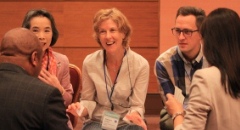 With the theme “Imagine Tomorrow”, the forum connected innovators with practical knowledge, the latest WHO data and framework and a diverse stakeholder network that shares in common an interest in the physical, mental and social well-being of older people towards innovation for healthy ageing.
With the theme “Imagine Tomorrow”, the forum connected innovators with practical knowledge, the latest WHO data and framework and a diverse stakeholder network that shares in common an interest in the physical, mental and social well-being of older people towards innovation for healthy ageing.
Results
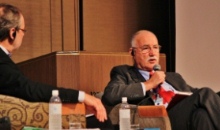 The report of the Second WHO Global Forum on Innovation for Ageing Populations entitled “Imagine Tomorrow”, based on its theme, showcases - in both static and interactive versions - the ideas, suggestions, experiences and tensions expressed during the forum on the journey from today’s realities to realizing tomorrow’s envisioned person-centred, integrated care and support systems that would enable older people to age in their communities and continue functioning and engaging in society at large. In the spirit of innovation, the Global Forum provided several platforms for participants to be able to connect, engage in conversations and share solutions in improving the lives of older people in different settings being a global imperative.
The report of the Second WHO Global Forum on Innovation for Ageing Populations entitled “Imagine Tomorrow”, based on its theme, showcases - in both static and interactive versions - the ideas, suggestions, experiences and tensions expressed during the forum on the journey from today’s realities to realizing tomorrow’s envisioned person-centred, integrated care and support systems that would enable older people to age in their communities and continue functioning and engaging in society at large. In the spirit of innovation, the Global Forum provided several platforms for participants to be able to connect, engage in conversations and share solutions in improving the lives of older people in different settings being a global imperative.
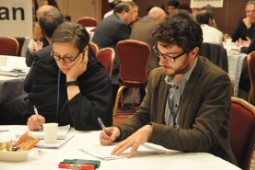 The report captured overcoming the stereotypes about older people that limit their opportunities; narrated a personal story on ageing in place; detailed “the 5Ps” that would enable ageing in place; and reiterated the need for ensuring that health services and care are accessible to everyone everywhere. In synthesizing documented inputs and discussions, the report upheld the Global Forum’s innovative and participative format by mirroring its interactive, conversational approach, thus, the contents were delineated as a series of conversations among older adults.
The report captured overcoming the stereotypes about older people that limit their opportunities; narrated a personal story on ageing in place; detailed “the 5Ps” that would enable ageing in place; and reiterated the need for ensuring that health services and care are accessible to everyone everywhere. In synthesizing documented inputs and discussions, the report upheld the Global Forum’s innovative and participative format by mirroring its interactive, conversational approach, thus, the contents were delineated as a series of conversations among older adults.
Moving forward
The Second WHO Global Forum on Innovation for Ageing Populations, convened shortly after the launch of the Sustainable Development Goals 2016-2030 and the release of the first WHO World Report on Ageing and Health (WHO, 2015), has set the stage and momentum for continuing efforts on how health systems, the health sector and other sectors of society can be imagined to be transformed to provide coordinated health and care services, as close as possible to older people in the community.
It, therefore, urges all participants and readers to go beyond just having the conversations, towards concrete actions for older people. WHO and the WHO Kobe Centre invite all in moving forward together to share the inputs, lessons, research, insights and questions embodied in the report to advance social and technological innovations for ageing populations in order to “create tomorrow” that has been imagined at the forum.



